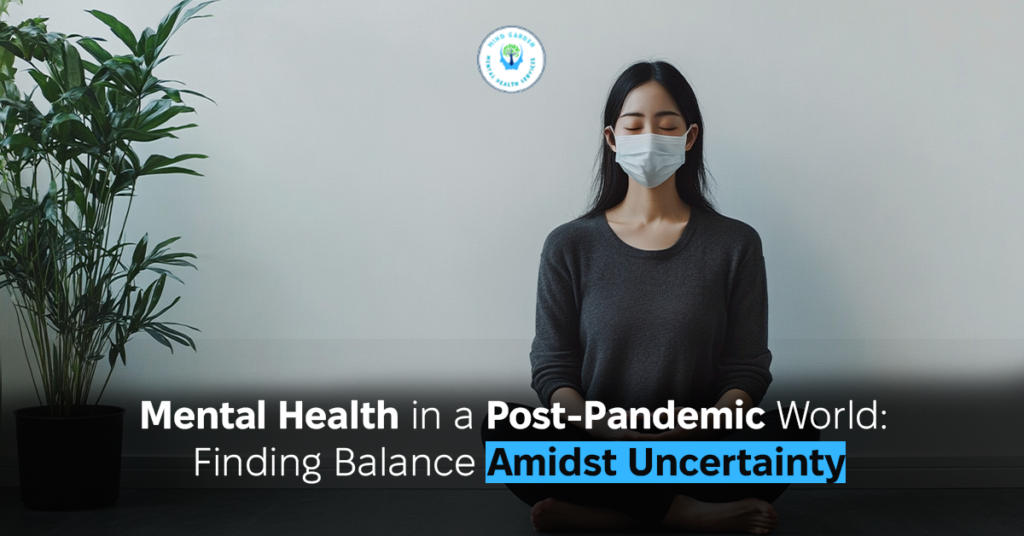
As the world begins to recover from the COVID-19 pandemic, mental health remains a pressing issue. The unprecedented nature of the pandemic has left lasting emotional and psychological impacts on many individuals. Anxiety, depression, and burnout have become more common, particularly as people attempt to adjust to a new normal. This adjustment is often complicated by a feeling of uncertainty, which can intensify stress and emotional exhaustion. In many cases, there is a societal push to “return to normal,” often without acknowledging the trauma or mental health burdens many people still carry from the pandemic.
Finding Balance Amidst Uncertainty
Addressing these mental health challenges requires an integrative approach that combines therapeutic techniques, mindfulness, nutritional support, and resilience-building strategies. Here are some science-backed methods to help restore mental balance in a post-pandemic world:
-
Therapy:
Cognitive Behavioral Therapy (CBT) remains one of the most effective ways to manage anxiety and depression, both of which have become more prevalent due to the pandemic. CBT focuses on identifying and altering negative thought patterns, which can help individuals regain emotional control and reduce feelings of anxiety or depression. In a study conducted among healthcare workers in Italy, high levels of anxiety (61%) and depression (62%) were reported, highlighting the need for therapeutic interventions like CBT (Ghio et al., 2021).
-
Mindfulness and Meditation:
Incorporating mindfulness practices such as meditation has proven to be a powerful tool in reducing symptoms of stress and anxiety. Mindfulness encourages individuals to be present in the moment and to manage their emotional reactions to stress, which helps build resilience over time. Research on frontline nurses during the COVID-19 pandemic showed that mindfulness significantly improved their emotional well-being, helping them cope with high levels of burnout, fear, and stress (Hu et al., 2020).
-
Nutrition:
The gut-brain axis plays a significant role in mental health. Research suggests that a healthy gut can help alleviate symptoms of anxiety and depression. A balanced diet rich in fiber and probiotics, which supports healthy gut bacteria, is essential for promoting mental well-being. A study conducted during the pandemic found that individuals who had better nutritional habits were less likely to suffer from severe anxiety and depression, underscoring the link between gut health and mental health (Cyr et al., 2021).
-
Resilience and Social Support:
Building emotional resilience through strong social networks and community support is another critical component in recovering from mental health challenges. Research has shown that individuals with higher levels of social support experience lower rates of burnout, anxiety, and depression. In fact, resilience-building programs that emphasize social connection have been effective in protecting healthcare workers and other high-risk populations from long-term mental health issues (Gramaglia et al., 2021).
For more information and support , contact us today.
Conclusion
In a post-pandemic world, achieving mental balance is more crucial than ever. By combining evidence-based therapies like CBT, mindfulness practices, gut-healthy nutrition, and a focus on resilience through social support, individuals can begin to rebuild their mental well-being and thrive amidst ongoing uncertainty.
References
- Ghio, L., Patti, S., Piccinini, G., Modafferi, C., Lusetti, E., Mazzella, M., & Del Sette, M. (2021). Anxiety, depression, and risk of post-traumatic stress disorder in health workers: The relationship with burnout during COVID-19 pandemic in Italy. International Journal of Environmental Research and Public Health, 18(18), 9929.
- Hu, D., Kong, Y., Li, W., Han, Q., Zhang, X., Zhu, L., Wan, S., Liu, Z., Shen, Q., Yang, J., & Zhu, J. (2020). Frontline nurses’ burnout, anxiety, depression, and fear statuses and their associated factors during the COVID-19 outbreak in Wuhan, China: A large-scale cross-sectional study. EClinicalMedicine, 24, 100424.
- Cyr, S., Marcil, M., Marin, M., Tardif, J., Guay, S., Guertin, M., Rosa, C., Genest, C., Forest, J., Lavoie, P., & Labrosse, M. (2021). Factors associated with burnout, post-traumatic stress, and anxio-depressive symptoms in healthcare workers three months into the COVID-19 pandemic: An observational study. Frontiers in Psychiatry, 12, 668278.
- Gramaglia, C., Marangon, D., Azzolina, D., Guerriero, C., Lorenzini, L., Probo, M., Rudoni, M., Gambaro, E., & Zeppegno, P. (2021). The mental health impact of 2019-nCOVID on healthcare workers from North-Eastern Piedmont, Italy: Focus on burnout. Frontiers in Public Health, 9, 667379.
